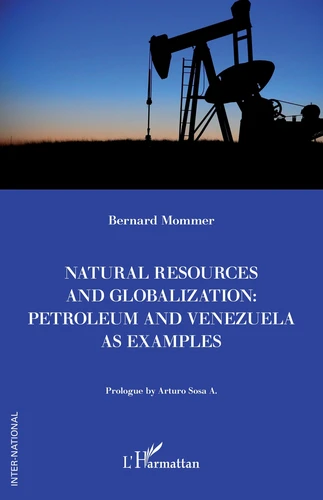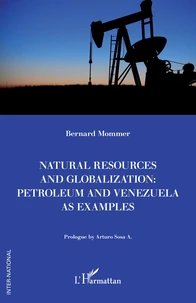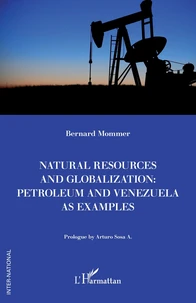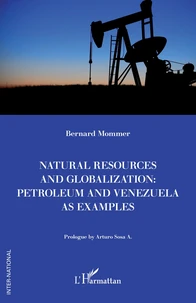- Accueil /
- Bernard Mommer
Bernard Mommer
Bernard Mommer est titulaire d'un diplôme en mathématiques (1967) et d'un doctorat en sciences sociales (1976, université de Tübingen, Allemagne). Il s'est consacré dès 1970 à des recherches sur l'économie politique du pétrole. Parmi ses nombreuses publications sur le sujet on retiendra Die Ölfrage (1983), et son dernier ouvrage Recursos Naturales y Globalización : Petróleo y Venezuela como ejemplos (2021). Devenu citoyen vénézuélien en 1987, de 2005 à 2008 il a été vice-ministre des hydrocarbures et, de 2008 à 2015, gouverneur du Venezuela auprès de l'OPEP à Vienne.
Bernard Mommer est titulaire d'un diplôme en mathématiques (1967) et d'un doctorat en sciences sociales (1976, université de Tübingen, Allemagne). Il s'est consacré dès 1970 à des recherches sur l'économie politique du pétrole. Parmi ses nombreuses publications sur le sujet on retiendra Die Ölfrage (1983), et son dernier ouvrage Recursos Naturales y Globalización : Petróleo y Venezuela como ejemplos (2021). Devenu citoyen vénézuélien en 1987, de 2005 à 2008 il a été vice-ministre des hydrocarbures et, de 2008 à 2015, gouverneur du Venezuela auprès de l'OPEP à Vienne.

Dernière sortie
Natural resources and globalization
Bernard Mommer concentrates on the relationship between transnational capital and the extraction of natural resources. Capital from its beginning has sought to deny the right of petroleum exporting countries to capture an international ground rent. Its objectives today include imposing on consumers the costs of world-wide policies related to the protection of the environment.
As part of the process of globalization, transnational capital is imposing over sovereign national rights a private international structure of arbitration.
The author focuses on the example of petroleum, given that it is by far the most important one, and of Venezuela, the most important petroleum exporting country during the 20th century. He also analyzes the impact of this development to the European Union and the Energy Charter Treaty, to Russia, to Germany, and to the ongoing negotiations between the European Union and Canada. One benefits from this book to the extent that reading it renews the desire to make an effective contribution to improving the legacy that the generation which we belong to intends to leave to subsequent ones (Arturo Sosa A., prologue).
The author focuses on the example of petroleum, given that it is by far the most important one, and of Venezuela, the most important petroleum exporting country during the 20th century. He also analyzes the impact of this development to the European Union and the Energy Charter Treaty, to Russia, to Germany, and to the ongoing negotiations between the European Union and Canada. One benefits from this book to the extent that reading it renews the desire to make an effective contribution to improving the legacy that the generation which we belong to intends to leave to subsequent ones (Arturo Sosa A., prologue).
Bernard Mommer concentrates on the relationship between transnational capital and the extraction of natural resources. Capital from its beginning has sought to deny the right of petroleum exporting countries to capture an international ground rent. Its objectives today include imposing on consumers the costs of world-wide policies related to the protection of the environment.
As part of the process of globalization, transnational capital is imposing over sovereign national rights a private international structure of arbitration.
The author focuses on the example of petroleum, given that it is by far the most important one, and of Venezuela, the most important petroleum exporting country during the 20th century. He also analyzes the impact of this development to the European Union and the Energy Charter Treaty, to Russia, to Germany, and to the ongoing negotiations between the European Union and Canada. One benefits from this book to the extent that reading it renews the desire to make an effective contribution to improving the legacy that the generation which we belong to intends to leave to subsequent ones (Arturo Sosa A., prologue).
The author focuses on the example of petroleum, given that it is by far the most important one, and of Venezuela, the most important petroleum exporting country during the 20th century. He also analyzes the impact of this development to the European Union and the Energy Charter Treaty, to Russia, to Germany, and to the ongoing negotiations between the European Union and Canada. One benefits from this book to the extent that reading it renews the desire to make an effective contribution to improving the legacy that the generation which we belong to intends to leave to subsequent ones (Arturo Sosa A., prologue).
Les livres de Bernard Mommer

Natural resources and globalization. Petroleum and Venezuela as examples
Arturo A. Sosa, Bernard Mommer
E-book
23,99 €

22,99 €

22,99 €

Natural resources and globalization. Petroleum and Venezuela as examples
Arturo A. Sosa, Bernard Mommer
Grand Format
30,00 €

29,00 €
